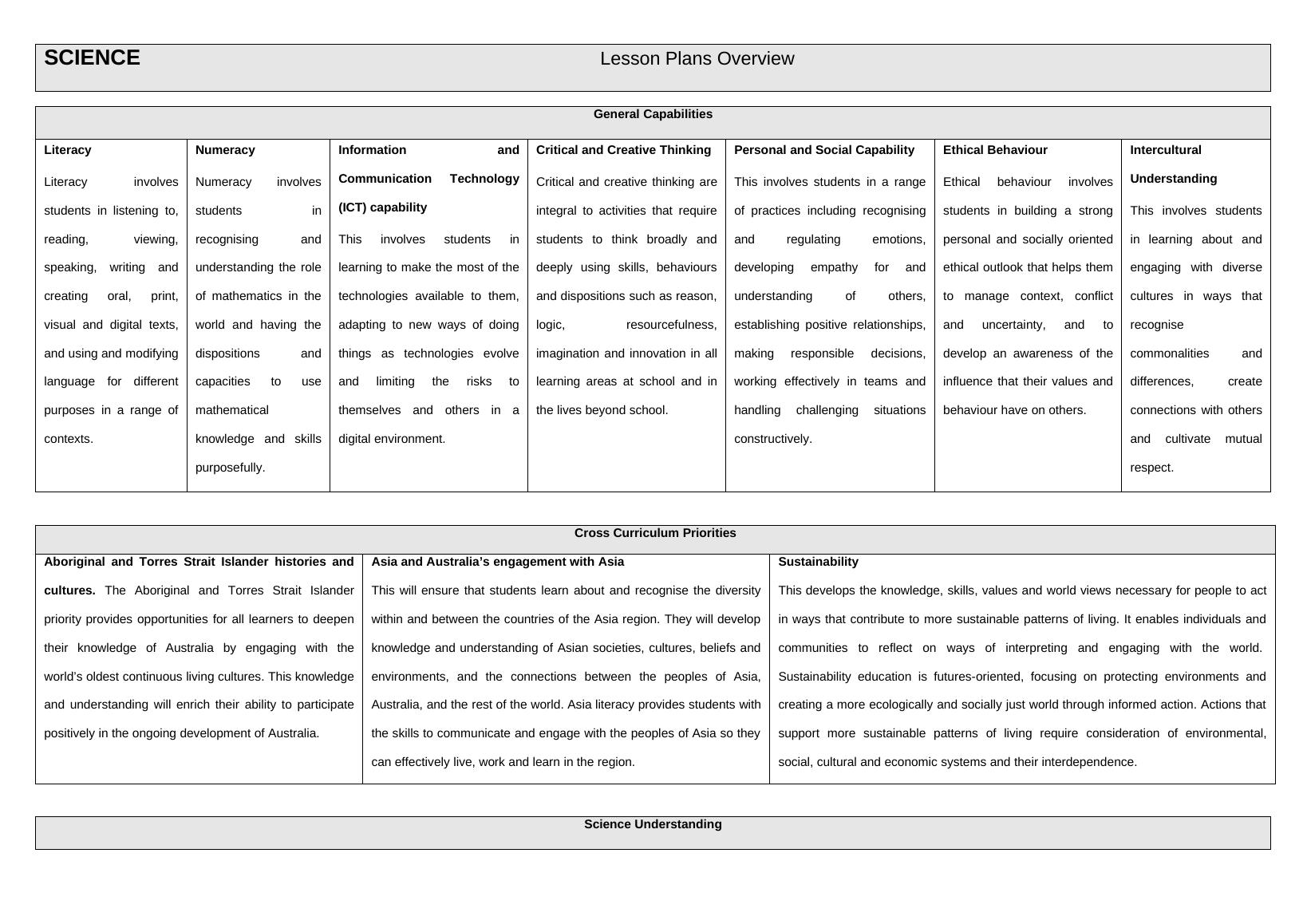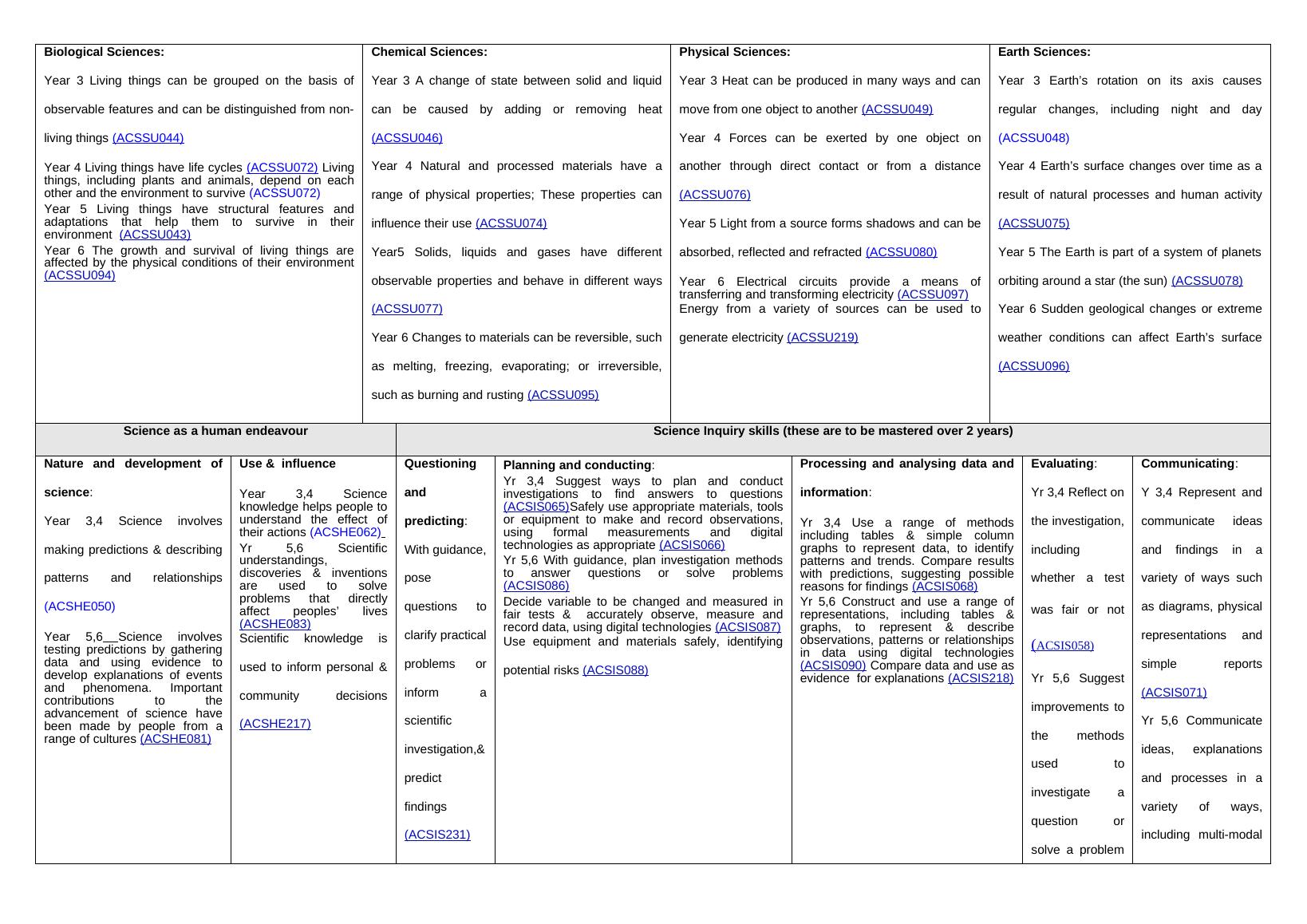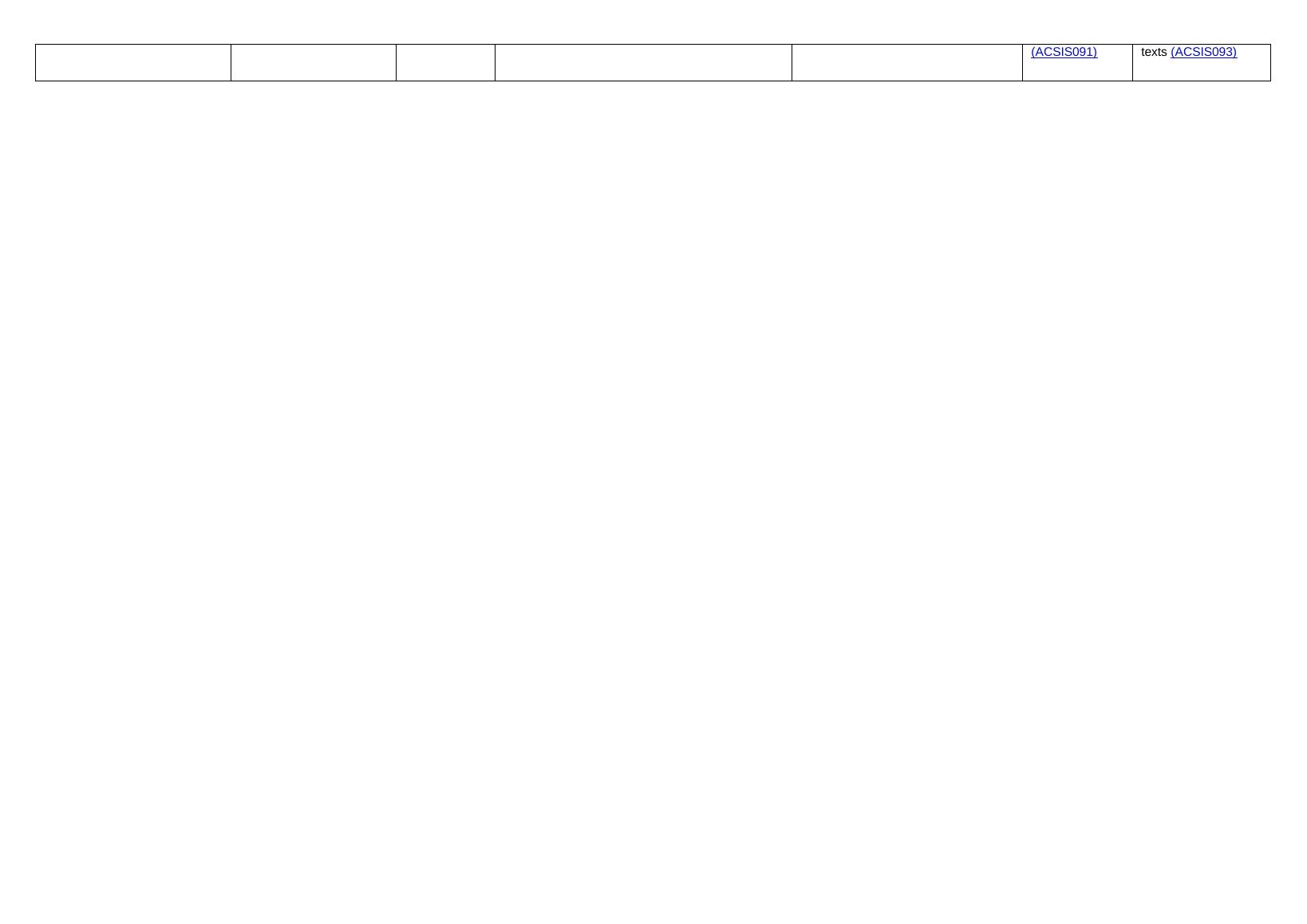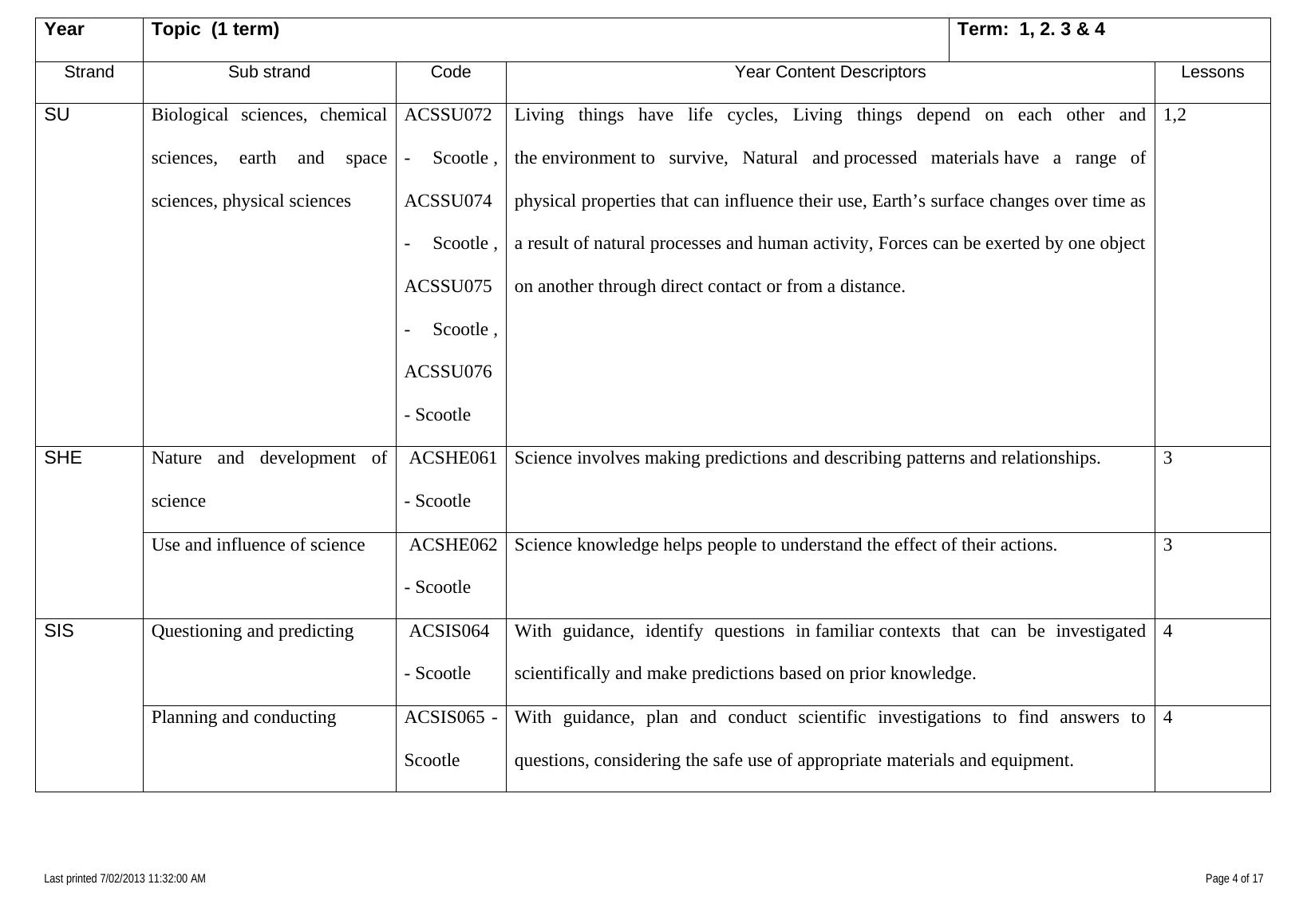General capabilities - Literacy - Literacy
Added on 2020-05-16
16 Pages3711 Words170 Views
SCIENCE Lesson Plans OverviewGeneral CapabilitiesLiteracyLiteracy involvesstudents in listening to,reading, viewing,speaking, writing andcreating oral, print,visual and digital texts,and using and modifyinglanguage for differentpurposes in a range ofcontexts.NumeracyNumeracy involvesstudents inrecognising andunderstanding the roleof mathematics in theworld and having thedispositions andcapacities to usemathematicalknowledge and skillspurposefully.InformationandCommunication Technology(ICT) capability This involves students inlearning to make the most of thetechnologies available to them,adapting to new ways of doingthings as technologies evolveand limiting the risks tothemselves and others in adigital environment.Critical and Creative ThinkingCritical and creative thinking areintegral to activities that requirestudents to think broadly anddeeply using skills, behavioursand dispositions such as reason,logic, resourcefulness,imagination and innovation in alllearning areas at school and inthe lives beyond school.Personal and Social CapabilityThis involves students in a rangeof practices including recognisingand regulating emotions,developing empathy for andunderstanding of others,establishing positive relationships,making responsible decisions,working effectively in teams andhandling challenging situationsconstructively.Ethical BehaviourEthical behaviour involvesstudents in building a strongpersonal and socially orientedethical outlook that helps themto manage context, conflictand uncertainty, and todevelop an awareness of theinfluence that their values andbehaviour have on others.InterculturalUnderstandingThis involves studentsin learning about andengaging with diversecultures in ways thatrecognisecommonalities anddifferences, createconnections with othersand cultivate mutualrespect.Cross Curriculum PrioritiesAboriginal and Torres Strait Islander histories andcultures. The Aboriginal and Torres Strait Islanderpriority provides opportunities for all learners to deepentheir knowledge of Australia by engaging with theworld’s oldest continuous living cultures. This knowledgeand understanding will enrich their ability to participatepositively in the ongoing development of Australia.Asia and Australia’s engagement with AsiaThis will ensure that students learn about and recognise the diversitywithin and between the countries of the Asia region. They will developknowledge and understanding of Asian societies, cultures, beliefs andenvironments, and the connections between the peoples of Asia,Australia, and the rest of the world. Asia literacy provides students withthe skills to communicate and engage with the peoples of Asia so theycan effectively live, work and learn in the region.SustainabilityThis develops the knowledge, skills, values and world views necessary for people to actin ways that contribute to more sustainable patterns of living. It enables individuals andcommunities to reflect on ways of interpreting and engaging with the world.Sustainability education is futures-oriented, focusing on protecting environments andcreating a more ecologically and socially just world through informed action. Actions thatsupport more sustainable patterns of living require consideration of environmental,social, cultural and economic systems and their interdependence.Science UnderstandingBiological Sciences: Year 3Living things can be grouped on the basis ofobservable features and can be distinguished from non-living things (ACSSU044)Year 4 Living things have life cycles (ACSSU072)Livingthings, including plants and animals, depend on eachother and the environment to survive (ACSSU072)Chemical Sciences: Year 3 A change of state between solid and liquidcan be caused by adding or removing heat(ACSSU046)Year 4 Natural and processed materials have arange of physical properties; These properties canPhysical Sciences: Year 3 Heat can be produced in many ways and canmove from one object to another (ACSSU049)Year 4 Forces can be exerted by one object onanother through direct contact or from a distance(ACSSU076)Earth Sciences: Year 3 Earth’s rotation on its axis causesregular changes, including night and day(ACSSU048)Year 4 Earth’s surface changes over time as aresult of natural processes and human activity

Year 5 Living things have structural features andadaptations that help them to survive in theirenvironment (ACSSU043)Year 6 The growth and survival of living things areaffected by the physical conditions of their environment(ACSSU094)influence their use (ACSSU074)Year5 Solids, liquids and gases have differentobservable properties and behave in different ways(ACSSU077)Year 6 Changes to materials can be reversible, suchas melting, freezing, evaporating; or irreversible,such as burning and rusting (ACSSU095)Year 5 Light from a source forms shadows and can beabsorbed, reflected and refracted (ACSSU080)Year 6 Electrical circuits provide a means oftransferring and transforming electricity (ACSSU097)Energy from a variety of sources can be used togenerate electricity (ACSSU219)(ACSSU075)Year 5 The Earth is part of a system of planetsorbiting around a star (the sun) (ACSSU078)Year 6 Sudden geological changes or extremeweather conditions can affect Earth’s surface(ACSSU096)Science as a human endeavourScience Inquiry skills (these are to be mastered over 2 years)Nature and development ofscience: Year 3,4 Science involvesmaking predictions & describingpatterns and relationships(ACSHE050)Year 5,6Science involvestesting predictions by gatheringdata and using evidence todevelop explanations of eventsand phenomena. Importantcontributions to theadvancement of science havebeen made by people from arange of cultures (ACSHE081)Use & influence Year 3,4 Scienceknowledge helps people tounderstand the effect oftheir actions (ACSHE062)Yr 5,6 Scientificunderstandings,discoveries & inventionsare used to solveproblems that directlyaffect peoples’ lives(ACSHE083)Scientific knowledge isused to inform personal &community decisions(ACSHE217)Questioningandpredicting: With guidance,posequestions toclarify practicalproblems orinform ascientificinvestigation,&predictfindings(ACSIS231)Planning and conducting:Yr 3,4 Suggest ways to plan and conductinvestigations to find answers to questions(ACSIS065)Safely use appropriate materials, toolsor equipment to make and record observations,using formal measurements and digitaltechnologies as appropriate (ACSIS066)Yr 5,6 With guidance, plan investigation methodsto answer questions or solve problems(ACSIS086)Decide variable to be changed and measured infair tests & accurately observe, measure andrecord data, using digital technologies (ACSIS087)Use equipment and materials safely, identifyingpotential risks (ACSIS088)Processing and analysing data andinformation: Yr 3,4 Use a range of methodsincluding tables & simple columngraphs to represent data, to identifypatterns and trends. Compare resultswith predictions, suggesting possiblereasons for findings (ACSIS068)Yr 5,6 Construct and use a range ofrepresentations, including tables &graphs, to represent & describeobservations, patterns or relationshipsin data using digital technologies(ACSIS090)Compare data and use asevidence for explanations (ACSIS218)Evaluating: Yr 3,4 Reflect onthe investigation,includingwhether a testwas fair or not(ACSIS058)Yr 5,6 Suggestimprovements tothe methodsused toinvestigate aquestion orsolve a problem(ACSIS091)Communicating: Y 3,4 Represent andcommunicate ideasand findings in avariety of ways suchas diagrams, physicalrepresentations andsimple reports(ACSIS071)Yr 5,6 Communicateideas, explanationsand processes in avariety of ways,including multi-modaltexts (ACSIS093)

Year Topic (1 term)Term: 1, 2. 3 & 4Strand Sub strandCodeYear Content Descriptors LessonsSU Biological sciences, chemicalsciences, earth and spacesciences, physical sciencesACSSU072- Scootle,ACSSU074- Scootle,ACSSU075- Scootle,ACSSU076- ScootleLiving things have life cycles,Living things depend on each other andtheenvironmentto survive,Natural andprocessed materialshave a range ofphysical properties that can influence their use, Earth’s surface changes over time asa result of natural processes and human activity, Forces can be exerted by one objecton another through direct contact or from a distance.1,2SHENature and development ofscienceACSHE061- ScootleScience involves making predictions and describing patterns and relationships.3Use and influence of scienceACSHE062- ScootleScience knowledge helps people to understand the effect of their actions.3SIS Questioning and predictingACSIS064- ScootleWith guidance, identify questions infamiliarcontexts that can be investigatedscientifically and make predictions based on prior knowledge.4Planning and conductingACSIS065 -ScootleWith guidance, plan and conduct scientific investigations to find answers toquestions, considering the safe use of appropriate materials and equipment.4Processing and analysing dataand informationACSIS068 -ScootleUse a range of methods including tables and simple column graphs torepresentdataand to identify patterns and trends.5EvaluatingACSIS069 -ScootleReflect oninvestigations, including whether a test was fair or not.5CommunicatingACSIS071 -ScootleRepresent and communicate observations, ideas and findings using formal andinformal representations.5Last printed 7/02/2013 11:32:00 AMPage 3 of 16

Learning ExperiencesMajor Content Focus: Lesson1Engage: Mentally engagesstudents, captures interest, Able toexpress what they know The students will be able to engage themselves in the lesson mentally. They will find interest and able to tellwhat they already know about the subject.Lesson2Explore: Hands on activity,explore the concept or skill. Makesense of the concept or skill(this maytake more than 1 lesson and becombined with explore)The students will be able participate actively in hands on activity and explore new skills while learning anddoing hands on work.Lesson3Explain: Explanations are madeon the concept or skill. Explanationfollows experience.The students will be able to understand and explain a scientific phenomena and the lesson will teach them toapply their knowledge to solve problems and give explanation of a given answer.Lesson4Elaborate:Providesopportunities to apply the concept orskill. Develops a deeper understandingof the concept or skill (this may includean investigation)The students will learn to elaborately explain a concept or a lesson they learnt or a skill they earned.Lesson5Evaluate: Continue thedevelopment of the understanding ofthe skill and evaluate their learning.The students will be to evaluated on what they learnt and they will be able to answer the questions on thelessons taught.Last printed 7/02/2013 11:32:00 AMPage 4 of 16

End of preview
Want to access all the pages? Upload your documents or become a member.
Related Documents
Critical Analysis of Australian Curriculum Unit Planlg...
|12
|3492
|117
ABORIGINALS AND TORRES STRAIT ISLANDER PEOPLE.lg...
|4
|455
|62
Annotated Bibliography Assignment Solvedlg...
|14
|3171
|308
Masters of Social Work Qualifying: Aboriginal and Torres Strait Islander Peoplelg...
|14
|4173
|43
Ethics, Sustainability and Culture - Aboriginal People of Australialg...
|5
|1354
|488
Understanding the Effectiveness Within an Organizationlg...
|5
|1286
|98
